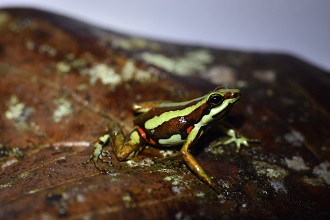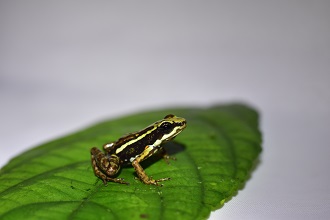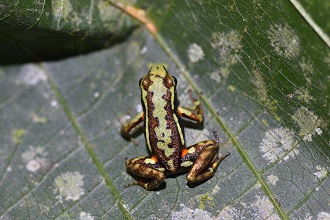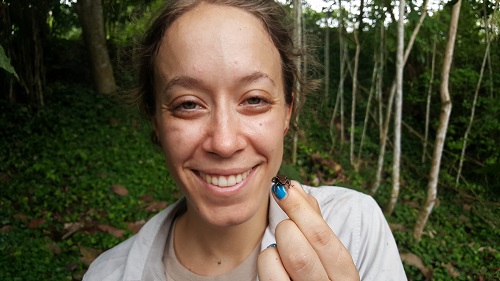This profile is part of a series of New Faculty Profiles that highlight and introduce up-and-coming PIs in SSE. We invite highlighted faculty to discuss their research, describe how SSE has impacted their career, and share any tips or stories they may have for other researchers.
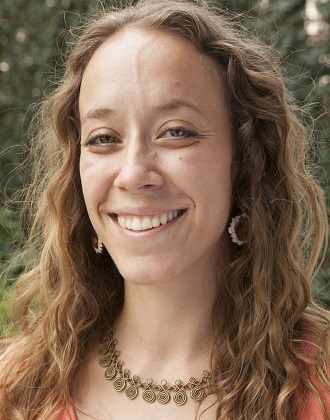 Rebecca Tarvin
Rebecca Tarvin
Assistant Professor & Assistant Curator
Department of Integrative Biology & Museum of Vertebrate Zoology
University of California, Berkeley
www.tarvinlab.org
Twitter: @frogsicles
Start date: July 2019
PhD: University of Texas at Austin; Advisor: David Cannatella & Harold Zakon.
Postdoc: University of Texas at Austin; Advisor: David Cannatella. Miller Fellow, Miller Institute for Basic Research in Science.
About the department:
The Integrative Biology Department at UCB houses a dynamic group of biologists and museums, encompassing pieces of what used to be Zoology, Botany, Physiology- Anatomy, Paleontology, and Genetics departments (until 1989). Aside from being an Assistant Professor in IB, I am an Assistant Curator at the Museum of Vertebrate Zoology, which is an inspirational and warm environment for pursuing evolutionary biology, field research, and working with non-model systems. We have a shared molecular lab, which I love!
About the research:
Research in my lab integrates studies of natural history with genomics and phylogenetics. Specifically, our research aims to elucidate causal genetic mechanisms underlying novel traits, to characterize phenotypic diversification at macro and micro-evolutionary scales, and to identify factors that promote and constrain biodiversity. Projects tend to focus on the evolution of chemical defenses; current systems include poison frogs, toads, salamanders, flies, and snakes. Although most of our work is directed at non-model systems in the Bay Area and South America, we are working to get an experimental evolution model with Drosophila up and running in the lab.
What has been the biggest challenge as a new PI so far?
In graduate school I had three major burn-outs from over-working myself, so I've been careful to try to balance the time I spend working with my personal life. This means that I need to heavily prioritize my day-to-day tasks, which can be challenging when everything seems important. I think for me it's been most difficult to reconcile that some things that aren't that important to me are important to other people, and to accept that I can't please everyone all the time.
What has been the biggest surprise so far about being a new PI?
I was surprised to realize how much I love mentoring (even more than I thought I already did). It's a true reward to work with such talented students and to see them grow in skills and confidence over time.
Do you remember your first publication in Evolution or Evolution Letters (acceptance or rejection)?
Yes! I'm actually still working on a paper that was rejected by Evolution in 2016, which was pretty disheartening at the time. Looking back, it was not ready to be published, and the reviews I received played an important part in how I'm revising the analyses now.
How do you think evolutionary research benefits society?
Part of why I got into research was because I'm a very curious person. I love that evolution has the answers to a lot of our "why" questions, and for that reason find this job not only intellectually satisfying but also personally satisfying. Thus, I think that anyone who wants to know more about the world around them can benefit from evolutionary research simply because it fulfills these curiosities. Case in point: "Does it Fart?" was a NYT best seller.
Do you have a time management tip to share?
A colleague of mine said that she spends the first two hours every day on her own research. I've adopted this practice and found that it helps me maintain research (rather than email or other things) as a priority. I block out these time-slots from meetings or any other tasks. It has made a huge difference in how I spend my time day to day. Previously, it was easy to spend an hour or two on email in the mornings before tending to anything else. I have also tried to schedule intensive tasks (like research and reading) for my more productive morning hours while scheduling more time-filling tasks (like meetings or paperwork) in the afternoons.
What one piece of advice would you give to a starting graduate student?
Read widely. Then, as you begin research try to maintain several projects at different stages so you can be gathering data for one, analyzing another, and writing up the third. Whatever you do, do not wait until your fourth or fifth year to begin writing. In general, do what works for you; don't feel so pressured to adhere to what people tell you to do. There is no one pathway to success. Ask for and listen to people's advice, but be most willing to follow the advice from those who you want to emulate rather than those who seem successful but are not people you want to be. In any case, don't underestimate your own intuition and opinions -- it's ok to be different.
How was your first faculty meeting?
The first faculty meeting I attended had a controversial topic on the agenda. Afterwards, several colleagues came up to me to apologize for the controversial discussion. I thought it was kind of funny because I hadn't seen the meeting as overly controversial. Since then, I've been impressed with how members of our faculty speak their minds and don't shy away from broaching difficult topics.
What is something most people don’t know about you?
With my herpetology background, I've long shied away from birding, but now I'm VERY into back-yard birding and I keep a house list. I get very excited when I can snap a photo of a new bird, add it to iNaturalist, and then I'll allow myself to add it to the official house list. I'm up to 17!
